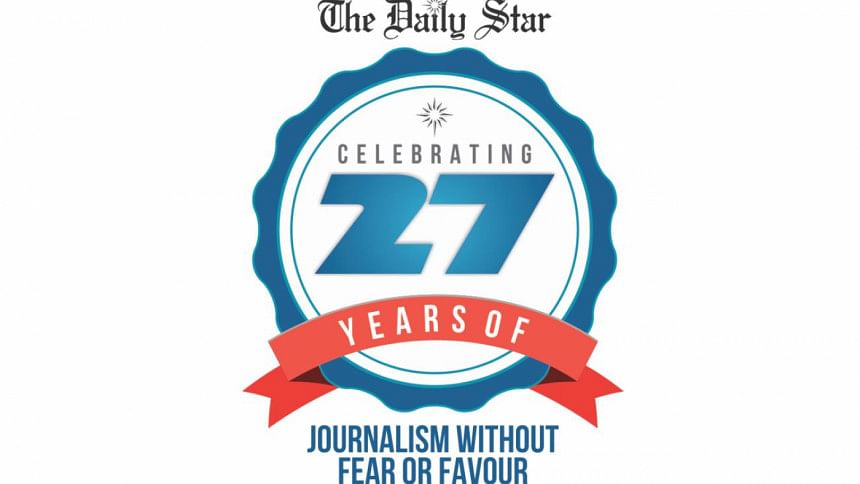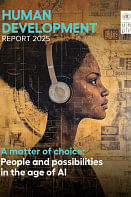A THANK YOU AND A PLEDGE

On the occasion of the 27th anniversary of this paper, we, The Daily Star family -- directors, management and staff -- express our sincere gratitude to our readers, patrons, advertisers and well-wishers. We have said it before, but it's worth repeating that without our readers we really don't exist in any journalistic sense.
Readers give us life, strength, courage and energy to continue to work hard. They are the reason why advertisers come to newspapers. Bigger the readership, bigger the revenue and, therefore, greater a newspaper's opportunity to do better journalism and thus better serve its readers. That has been, and continues to be, our motto.
There have been many ups and down during this 27-year journey. But we have been steadfast throughout in adhering to the principles of ethical journalism and speaking truth to the power.
Since our birth in 1991, coinciding with the fall of Ershad regime and the restoration of democracy, we have been an integral part of the nation's endeavour to build a democratic society and rejoiced at every effort to give it an institutional shape and protested loudly at any step that pushed the process backward.
We have been a staunch advocate of a responsible private sector-driven economic growth and have published lengthy reports on bank defaults, tax frauds, bad business practices and the like. We have advocated government policies that would make our industry more competitive and legal reforms that would spur growth. We have also supported business practices that would take our corporate world forward towards global standards.
On fighting corruption, The Daily Star's voice has been louder than the most and the paper has never shied away from warning the government and the regulators about its severe negative consequences, often to no avail.
Since the last general election in 2014, we have witnessed a gradual but definite rise of intolerance for dissenting views and a shrinking of space for the civil society. The enactment of the ICT Act and later the draft approved by the cabinet of the Digital Security Act has further added to our worries.
Independent journalism lies at the heart of the democratic future of Bangladesh just as it did in its democratic past. It is only when we deviate from our commitment to freedom and fundamental rights that democracy suffers, and along with it independent journalism and the country as a whole.
As the process of graduating from the status of a least developed country (LDC), to a lower-middle income to a middle income country moves forward, so must the process of strengthening all legal instruments and institutions that ensure the fundamental rights and freedoms of the citizens.
The days of measuring development only through the prism of economic indicators have long gone. Today's concept of development is far more comprehensive, as it incorporates the relevant economic as well as social indicators with special emphasis on fundamental freedoms, particularly freedoms of thought, of speech and of action whose integral part is freedom of the media.
Why freedom of the media lies at the centre of all these essential freedom? Simply because free media is the most important vehicle for exercising the above mentioned freedom. It is obvious that without a free media there can be no freedom of thought or expression in the modern sense of their practice.
A point that is often forgotten and needs constant reiteration is that constitution of every democratic country, including that of Bangladesh, provides special protection for ONLY TWO professions, namely the JUDICIARY and the MEDIA. Examine the constitution of any country in the world committed to freedom of its citizens and to democracy, and you will find that every one of them has special articles that provide for protection of the judiciary and the media.
The question is why? Because experience has shown, over the years and across countries and cultures, that to protect democracy, to ensure rule of law, to hold public officials accountable, to ensure that elected governments fulfil their electoral mandates, to play the role of a “watchdog” of those holding high offices, to ensure that public money is spent properly and dig out cases of corruption and so on. For all of this, it is extremely necessary to have an independent judiciary and media specially protected by the constitution.
Because of that protection, the Bangladesh media has played a seminal role in the progress that has made our country a reference point in the global discussion on development and democracy. The image of Bangladesh that truly makes us proud is not only one of its economic success but of its democratic advancements as well.
And that is what is at stake today. An idea has been surreptitiously put forward that Bangladesh needs development first and that democracy will come once we have achieved a certain level of economic growth. The idea is fundamentally flawed and is belied by history and experience.
We strongly believe that for the future growth of Bangladesh we need both democracy and development simultaneously which is inclusive in the political sense and all -- encompassing in the economic sense.
And for that to happen we need an independent judiciary and powerful and professional media deeply committed to both the values of our Liberation War and those of ethical journalism.
That is the role that The Daily Star pledges to play today and tomorrow in spite of the obstacles that have already been placed in our path and the ones that may come our way in the future.

 For all latest news, follow The Daily Star's Google News channel.
For all latest news, follow The Daily Star's Google News channel. 





Comments